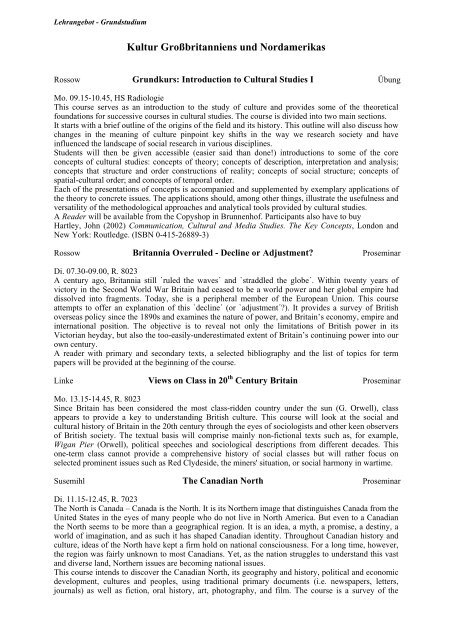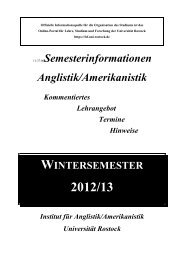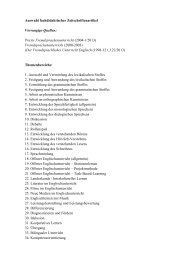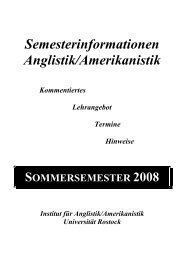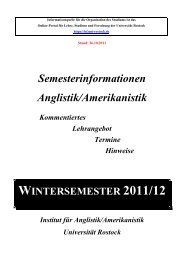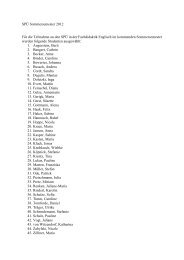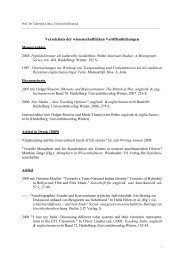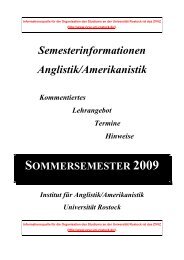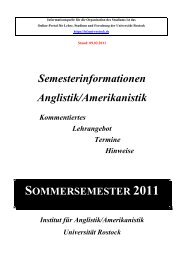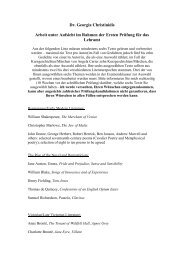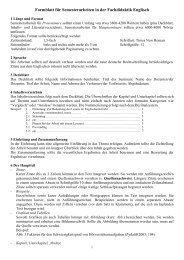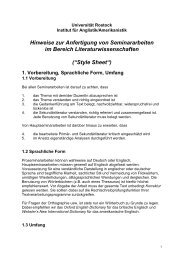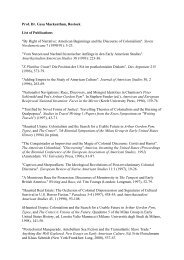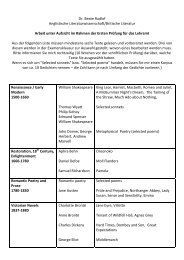SOMMERSEMESTER 2004 - Institut für Anglistik/Amerikanistik
SOMMERSEMESTER 2004 - Institut für Anglistik/Amerikanistik
SOMMERSEMESTER 2004 - Institut für Anglistik/Amerikanistik
You also want an ePaper? Increase the reach of your titles
YUMPU automatically turns print PDFs into web optimized ePapers that Google loves.
Lehrangebot - Grundstudium<br />
Kultur Großbritanniens und Nordamerikas<br />
Rossow Grundkurs: Introduction to Cultural Studies I Übung<br />
Mo. 09.15-10.45, HS Radiologie<br />
This course serves as an introduction to the study of culture and provides some of the theoretical<br />
foundations for successive courses in cultural studies. The course is divided into two main sections.<br />
It starts with a brief outline of the origins of the field and its history. This outline will also discuss how<br />
changes in the meaning of culture pinpoint key shifts in the way we research society and have<br />
influenced the landscape of social research in various disciplines.<br />
Students will then be given accessible (easier said than done!) introductions to some of the core<br />
concepts of cultural studies: concepts of theory; concepts of description, interpretation and analysis;<br />
concepts that structure and order constructions of reality; concepts of social structure; concepts of<br />
spatial-cultural order; and concepts of temporal order.<br />
Each of the presentations of concepts is accompanied and supplemented by exemplary applications of<br />
the theory to concrete issues. The applications should, among other things, illustrate the usefulness and<br />
versatility of the methodological approaches and analytical tools provided by cultural studies.<br />
A Reader will be available from the Copyshop in Brunnenhof. Participants also have to buy<br />
Hartley, John (2002) Communication, Cultural and Media Studies. The Key Concepts, London and<br />
New York: Routledge. (ISBN 0-415-26889-3)<br />
Rossow Britannia Overruled - Decline or Adjustment? Proseminar<br />
Di. 07.30-09.00, R. 8023<br />
A century ago, Britannia still `ruled the waves´ and `straddled the globe´. Within twenty years of<br />
victory in the Second World War Britain had ceased to be a world power and her global empire had<br />
dissolved into fragments. Today, she is a peripheral member of the European Union. This course<br />
attempts to offer an explanation of this `decline´ (or `adjustment´?). It provides a survey of British<br />
overseas policy since the 1890s and examines the nature of power, and Britain’s economy, empire and<br />
international position. The objective is to reveal not only the limitations of British power in its<br />
Victorian heyday, but also the too-easily-underestimated extent of Britain’s continuing power into our<br />
own century.<br />
A reader with primary and secondary texts, a selected bibliography and the list of topics for term<br />
papers will be provided at the beginning of the course.<br />
Linke Views on Class in 20 th Century Britain Proseminar<br />
Mo. 13.15-14.45, R. 8023<br />
Since Britain has been considered the most class-ridden country under the sun (G. Orwell), class<br />
appears to provide a key to understanding British culture. This course will look at the social and<br />
cultural history of Britain in the 20th century through the eyes of sociologists and other keen observers<br />
of British society. The textual basis will comprise mainly non-fictional texts such as, for example,<br />
Wigan Pier (Orwell), political speeches and sociological descriptions from different decades. This<br />
one-term class cannot provide a comprehensive history of social classes but will rather focus on<br />
selected prominent issues such as Red Clydeside, the miners' situation, or social harmony in wartime.<br />
Susemihl The Canadian North Proseminar<br />
Di. 11.15-12.45, R. 7023<br />
The North is Canada – Canada is the North. It is its Northern image that distinguishes Canada from the<br />
United States in the eyes of many people who do not live in North America. But even to a Canadian<br />
the North seems to be more than a geographical region. It is an idea, a myth, a promise, a destiny, a<br />
world of imagination, and as such it has shaped Canadian identity. Throughout Canadian history and<br />
culture, ideas of the North have kept a firm hold on national consciousness. For a long time, however,<br />
the region was fairly unknown to most Canadians. Yet, as the nation struggles to understand this vast<br />
and diverse land, Northern issues are becoming national issues.<br />
This course intends to discover the Canadian North, its geography and history, political and economic<br />
development, cultures and peoples, using traditional primary documents (i.e. newspapers, letters,<br />
journals) as well as fiction, oral history, art, photography, and film. The course is a survey of the


